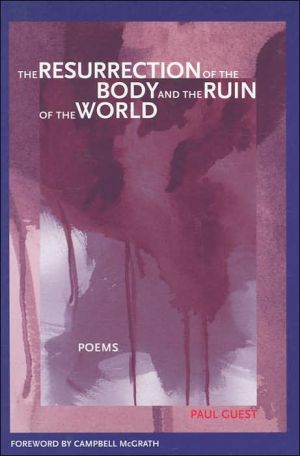

 |

|

The average rating for The Resurrection of the Body and the Ruin of the World: Poems based on 2 reviews is 4.5 stars.
Review # 1 was written on 2009-01-04 00:00:00 Alastair Ineson Alastair InesonJan Beatty, Red Sugar (University of Pittsburgh, 2008) Red Sugar has, perhaps, caused more controversy than any American book of poetry since the sixties. Not that many people have noticed, but Jan Beatty's third volume got a scheduled reading at a Joseph-Beth Booksellers location cancelled back in the summer. It's caused quite a stir among book nerds and the hardcore anti-censorship types, but as is usual in this country, poetry-related matters don't make the national headlines. That's too bad, because like all of us, Beatty, who is a fine poet, could certainly use the publicity. The controversy stems from the explicit nature of most of the poems here. I say "most" because there are some that are surprisingly tender (and some that don't seem to fit the theme at all). Where the real surprise kicks in is about two-thirds of the way through the book. You know Beatty's on a theme here, and as we progress we get deeper into that theme (in a predictable way; we get the present, and we dig deeper and deeper into the past until we get to the event that started it all), and then, all the sudden, wham, we get to "Serum": a left turn out of the blue that still fits. And that's when Red Sugar goes from being a very good book to a possibly great one. I'm not going to quote from those back pieces, because I don't want to spoil this for you (and I believe this is the first time I've ever referred to spoilers in a book of poetry), but I can't really quote from the first bits, because Amazon would redline this review faster than it would an excerpt from a porn film. So I'm stuck with quoting from one of the poems that doesn't really seem to fit until much later. But then it's one of my favorites in this book, so that's not a real hardship: "sometimes I look at people and think: I can feel the blade of your little machinery, turning inside you from some generator. cutting you off from yourself. no trace of the older couple down the street, their bodies he sliced into bits. up the cement ramp to the county jail, he looks down, pieces of skin still under his fingernails but nothing we can see. I think: look at his undiscovered cities. the buildings rising in him and their fierce armies. you can't tell how he packaged them in 6-inch squares, to be sent through the mail. christmas presents to the family. now the woman next door: he made good potato salad." ("Stray") Beatty takes the old "he was so quiet" cliché (in the stanza before I started quoting) and plays with it, twists it, makes it her own with the potato salad line. In between, all the transformation you could possibly want. (Contrast the language in here with that of the poem quoted in the Forgive My Trespassing review, elsewhere in this issue; can you see the difference in the power of the language here?) This is a wonderful book, and I'm hoping Beatty can find a way to get word of the controversy out there and use it to sell some copies. After all, who doesn't like reading about sex? **** |
Review # 2 was written on 2008-02-03 00:00:00 Shinichi Fujimoto Shinichi FujimotoI have not bought a book of poems in years. I heard Jan Beatty read some poems from her newest collection, The Switching/Yard, and I was so impressed by her complete vulnerability and sincerity in every line, I had to go buy her books. People who know poetry in general and her poetry in particular said I should also read this, because it was incredible. So I took their advice, and I read this first, since she wrote it first. Their advice was on the money. This was incredible. It's about really painful stuff -- having been raped, and not knowing who her birth father was, and doing drugs, and being in all kinds of dangerous situations. But it never feels exploitative, it continues to grapple with the drive to be alive, the push for life that is in the blood ("red sugar" is her descriptive term for blood), how she continues to choose, in spite of all the shit that has happened to her, to live, dammit, not to go down without a fight, that the fighting and the living are maybe the same thing. After I finished, I went back and read it again. On that reading, the close of one poem in particular stood out as the clarion call that maybe the collection as a whole makes. (On another reading, I might say the same of a different passage.) Here it is: Some people say this life is just an idea of life, but I say the highway of fear is real. & so we have this comic, this poem, this small, small matter of wanting to eat the world, swallow it up, say I was here. Powerful, stunning stuff. I can't wait to read the next one. |
CAN'T FIND WHAT YOU'RE LOOKING FOR? CLICK HERE!!!